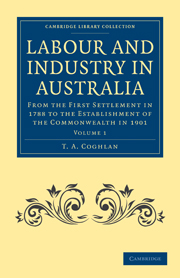 Labour and Industry in Australia
Labour and Industry in Australia Book contents
- Frontmatter
- PREFACE
- Contents
- PART I FROM THE FOUNDATION OF SETTLEMENT TO THE CROSSING OF THE MOUNTAINS
- PART II FROM THE CROSSING OF THE MOUNTAINS TO THE ABOLITION OF THE ASSIGNMENT SYSTEM
- PART III FROM THE ABOLITION OF THE ASSIGNMENT SYSTEM TO THE DISCOVERY OF GOLD
- I INTRODUCTION TO THE THIRD PERIOD
- II TRANSPORTATION
- III IMMIGRATION
- IV LAND LEGISLATION IN NEW SOUTH WALES, VAN DIEMEN'S LAND, AND WESTERN AUSTRALIA
- V LAND LEGISLATION AND SETTLEMENT IN SOUTH AUSTRALIA AND THE WAKEFIELD THEORY OF COLONIZATION
- VI LABOUR AND WAGES
- VII PRICES
- VIII FINANCIAL CRISIS OF 1841, 1842, AND 1843
- IX INDUSTRIES
- PART IV FROM THE DISCOVERY OF GOLD TO THE INTRODUCTION OF FREE SELECTION OF LAND BEFORE SURVEY
V - LAND LEGISLATION AND SETTLEMENT IN SOUTH AUSTRALIA AND THE WAKEFIELD THEORY OF COLONIZATION
Published online by Cambridge University Press: 05 August 2011
- Frontmatter
- PREFACE
- Contents
- PART I FROM THE FOUNDATION OF SETTLEMENT TO THE CROSSING OF THE MOUNTAINS
- PART II FROM THE CROSSING OF THE MOUNTAINS TO THE ABOLITION OF THE ASSIGNMENT SYSTEM
- PART III FROM THE ABOLITION OF THE ASSIGNMENT SYSTEM TO THE DISCOVERY OF GOLD
- I INTRODUCTION TO THE THIRD PERIOD
- II TRANSPORTATION
- III IMMIGRATION
- IV LAND LEGISLATION IN NEW SOUTH WALES, VAN DIEMEN'S LAND, AND WESTERN AUSTRALIA
- V LAND LEGISLATION AND SETTLEMENT IN SOUTH AUSTRALIA AND THE WAKEFIELD THEORY OF COLONIZATION
- VI LABOUR AND WAGES
- VII PRICES
- VIII FINANCIAL CRISIS OF 1841, 1842, AND 1843
- IX INDUSTRIES
- PART IV FROM THE DISCOVERY OF GOLD TO THE INTRODUCTION OF FREE SELECTION OF LAND BEFORE SURVEY
Summary
The Wakefield theory of colonization is summarized by Leroy-Beaulieu in the following formulae:
(1) The prosperity of new colonies depends chiefly on the quantity of manual labour, in proportion to the country occupied, that capitalists have at their disposal.
(2) Workers can be brought out from the Mother Country to the colonies at the public expense, in which case it is necessary to take measures to ensure that such persons work for hire for a considerable time after their arrival, say for two or three years at least.
(3) When land is sold by the colony it is desirable to place upon it a sufficiently high price, to prevent wage-earners becoming proprietors too soon.
(4) The whole of the proceeds of land sales should be set apart as a special fund to be used for the purpose of bringing to the colony immigrants from the Motherland. It is only by using the whole of this fund for immigration that it will be possible to maintain an exact balance between the quantity of land cultivated, the amount of manual labour, and the amount of capital available for such cultivation.
(5) The price of land should be uniform and fixed without reference to the quality of the land sold. The price of allotments should vary only with their area. Land, therefore, should not on any account be sold by auction.
- Type
- Chapter
- Information
- Labour and Industry in AustraliaFrom the First Settlement in 1788 to the Establishment of the Commonwealth in 1901, pp. 404 - 423Publisher: Cambridge University PressPrint publication year: 2011First published in: 1918


